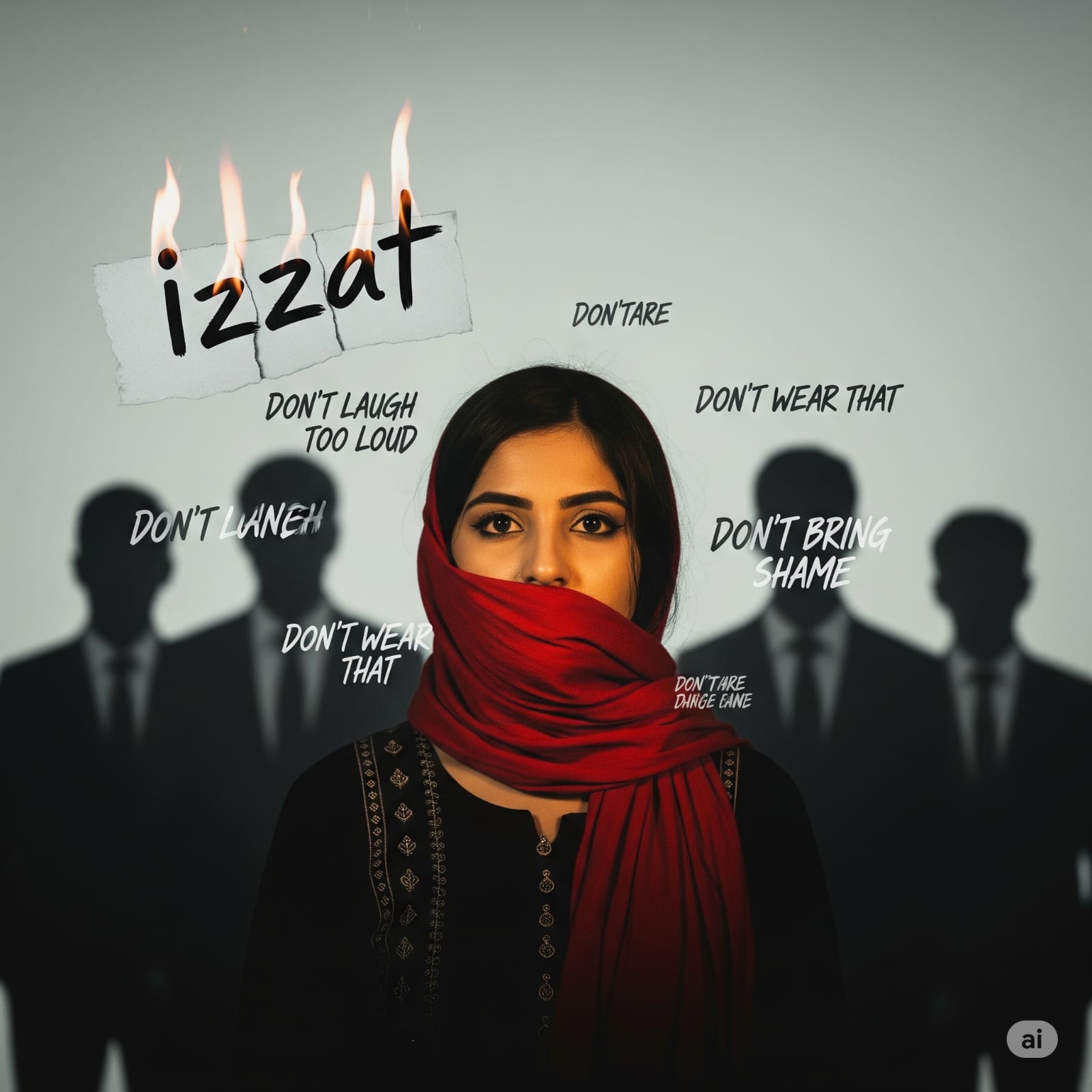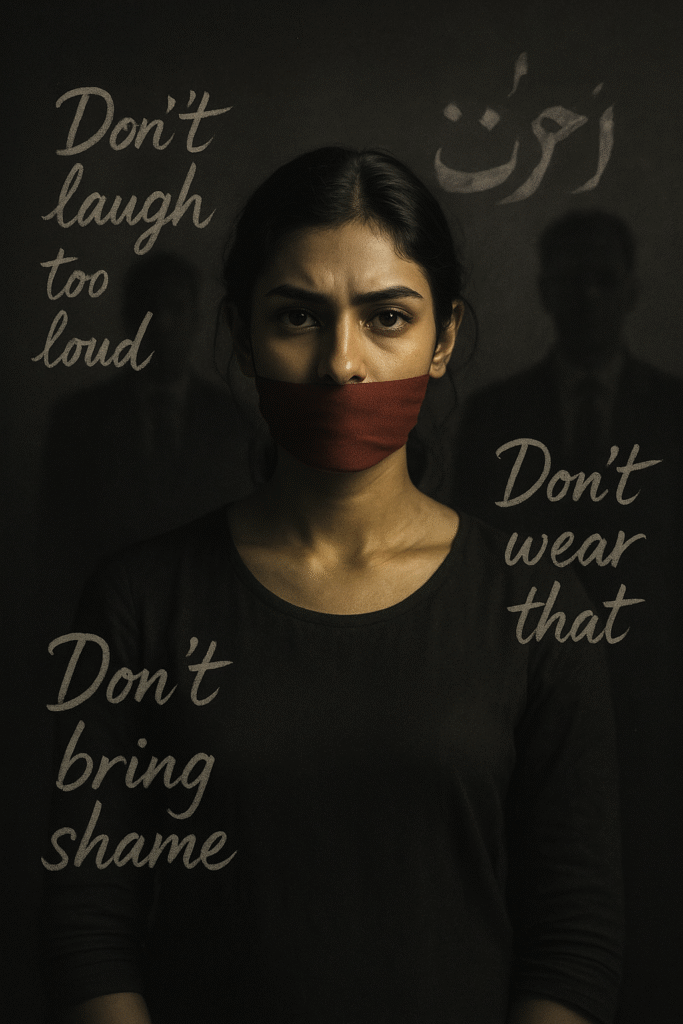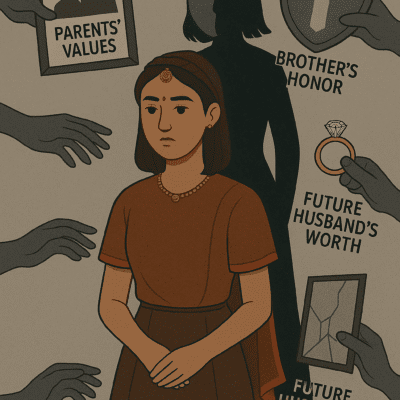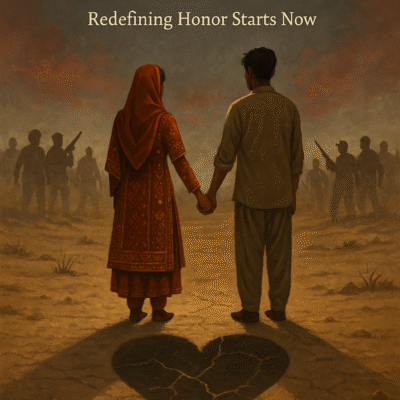Introduction: Honor Culture in Pakistan Controls, Not Protects
People use honor culture in Pakistan to justify violence, silence, and control over women. But honor never protected us; it only punished us. Let’s stop romanticizing what’s essentially a system of power. This blog uncovers how honor culture operates as a tool to dominate women and defend fragile male egos.
Honor Culture in Pakistan Silences Women for Men’s Control
Men define honor. Men enforce it. And women die for it, either. This harsh reality continues to thrive in Pakistani society, where influential figures often shape these gendered expectations, either reinforcing traditional norms or challenging them, as discussed in this critical examination of their role in marital practices. At the same time, media plays a double role, sometimes glamorizing toxic love and aggression, further embedding honor-based violence into cultural narratives, as seen in this analysis on the romanticization of violence.
Under honor culture in Pakistan, society labels a woman’s love as rebellion and her voice as defiance. When she chooses for herself, they accuse her of dishonor. But when a man kills her, they call him honorable.
One man kills.
One woman dies.
And society praises him.
We call that betrayal.
Honor culture never begins with death. It begins with words, commands masked as concern:
- “Don’t wear that.”
- “Don’t talk to him.”
- “Don’t bring shame.”
People use shame to break girls long before they bury them. Even men who never raise a hand often police women with their tone, their silence, or their “advice.”
When you shame her for laughing, question her for choosing, or judge her clothes, you uphold honor culture in Pakistan.
Urban Men and Honor Culture
Let’s stop blaming villages and poverty. Honor culture in Pakistan thrives just as easily in air-conditioned homes and English-speaking families.
Urban men may dress in suits and hold degrees, but many still expect women to shrink. Patriarchy does not always scream. It whispers. It says, “Think of the family,” when it means “Don’t embarrass me.”
City or village, it is all the same when men measure their worth through women’s silence.

Honor Culture in Pakistan Builds Male Ego on Women’s Back
In honor culture in Pakistan, men do not create their respect; they steal it from women.
- They measure pride by how quiet their sisters stay.
- They build status through their wives’ obedience.
- They claim dignity through their daughters’ restrictions.
If a man’s honor relies on someone else’s choices, then he has none of his own. If her voice threatens him, he holds no real strength.
Women carry the weight of entire generations’ reputations. Society expects us to stay small, speak softly, and give up our rights in exchange for “Respect.”
She wore jeans.”
“Laughed too loudly.”
“Married for love.”
“Didn’t ask permission.”
And so, they killed her.
Not just in body,
But in every girl’s memory,
as a warning.
In honor culture in Pakistan, people do not just bury women. They bury our courage, our choices, our futures.
Men Must Break The Cycle of Honor Culture in Pakistan
This is not a war on men, it is a challenge to men.
If you claim you would never hurt a woman, then stop letting others hurt her while you watch. Call it out. Unlearn what society taught you.
- Stop deciding for her.
- Stop tying your ego to her life.
- Start deciding behind her, not in her way.
Men protect honor culture in Pakistan when they stay silent. They help end it when they speak up.
The Girl screams

We carry generations of honor—but they silence us for wanting to live.
“Don’t laugh too loud.”
“Never sit like that.”
“Don’t speak unless spoken to.”
And above all? Don’t bring shame?
But let me ask you:
Shame for what?
For wanting to live?
To love?
To breathe in a room without fear dripping from the ceiling?
The cost of a good girl
is not paid in money.
It’s paid in silence.
in spine-bending expectations,
In wrists weighed down by bangles and burdens both.
They say she dishonoured the family.
No.
He dishonoured humanity.
She wore jeans.
Married by choice.
Laughed in public.
Didn’t ask for permission.
And so they buried her
Not just in the ground,
But in every girl’s memory:
“Stay in line. Or you could be next.”
Tell me!!
What is this “honor” that lives in her body
But does she have it in her hands?
This “izzat” that flares like fire
Only when she says no?
They say she was “too bold.”
I say, she was finally brave.
Because if good means invisible,
If good means dead
Then I refuse.
No more blood for ego.
No more graves for control.
The cost of a good girl
is far too high.
And I’m not paying it anymore.
Conclusion
People call us bold. They call us dishonorable, but they fear us because we stopped staying small.
We are not the side characters.
We are the story.”
We have stayed silent to protect the egos and have bent to carry respect on our backs due to honor culture in Pakistan. We have shrunk to fit into someone’s definition of “Izzat.” But we will not do it anymore. We choose our voice. Our bodies. Our lives.
We do not demand anything radical. We only demand the right way to:
- Speak without shame
- Choose without fear
- Live without control
Honor culture in Pakistan has buried too many women. It has excused too much cruelty. If a man feels threatened by a woman’s freedom, then he never had real honor to begin with.
Laws like the Prevention of Anti‑Women Practices Act and Protection of Women Against Violence Bill need rigorous implementation, especially in rural and conservative areas where awareness is low.



5 Comments